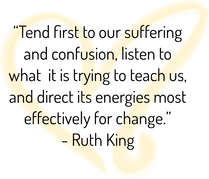|
I first learned this phrase from a meditation teacher years ago. It sounds simple, but it has powerful implications.
“Right now, it’s like this.” I am sometimes overwhelmed by the painful emotions of acknowledging injustice, especially when I’m confronted by my own responsibility for it. I’ve made choices about where we live, what school our kids go to, what communities we engage with, etc. that are only choices because of my racial and economic privilege. Housing discrimination, inequality in education, de facto segregation, access to public transportation, and a myriad of other systemic issues give choice (and therefor power) to people like me at the expense of many others. Currently at my learning edge, I’m discovering the implications of accepting opportunities afforded me by an unjust, deeply biased system. When I examine this, it feels like I’ve been receiving gifts from an ill-intentioned stranger, giving to me only to get what he wants. It brings up a queasy feeling to acknowledge the unintended debt I’ve acquired. (Read more from Eula Biss about “opportunity hoarding” and “white debt”.) There is no way to pay off this debt. I feel the discomfort. “Right now, it’s like this.” I accept what is real in this moment. I accept the debt that this body owes. I accept that things are this way right now. But I don’t accept the continuation of this system. Once I've let myself see the truth of injustice, I cannot look the other way. With this acceptance, I feel stronger. I’m not wasting energy resisting truth or indulging in denial, apathy, or despair. I am energized for the fight. Acceptance arms me with love, compassion, and wisdom for the revolution of consciousness we so desperately need. “Right now, it’s like this.”
0 Comments
Leave a Reply. |
The Power to Be Blog explores the use of mindfulness in shifting both individual and collective awareness toward a more just and loving world.
AuthorGrace Helms Kotre, MSW, shares mindfulness as a tool for empowerment with youth and adults in schools, organizations, businesses, and private lessons. Grace sees mindfulness as a radical and powerful tool for promoting justice, healing trauma, and bringing greater peace into our daily lives. |
|
Power to Be, LLC
Grace Helms Kotre, MSW Certified Mindfulness Instructor Social Justice Educator [email protected] Banner photo credit: @theodorrr |


